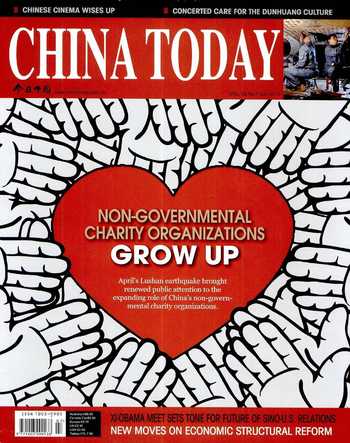Public Philanthropy:A Will, Now a Way
The Chinese people were never lacking in philanthropic spirit. During the decades after the founding of the PRC, however, this spirit lay dormant as the countrys citizens busied themselves with putting food in their own mouths.
By the end of the 20th century China had grown rich enough for a culture of giving to start developing. All it needed was a trigger, and this came in the form of the devastating Wenchuan earthquake in 2008.
The huge sums donated to victims of the Lushan earthquake last April, five years after Wenchuan, confirmed that philanthropy is here to stay in China.
According to the China Charity Federation, the year 2007 saw 75 percent of donations come from overseas, 15 percent from wealthy individuals, and the remaining 10 percent from middle and low-income groups. This donation structure was turned upside down by the Wenchuan earthquake. In 2008, the yearly total for national donations in China reached RMB 100 billion, 10-fold the figure of 2006. By September 2009, RMB 79.7 billion worth of donations had been made for relief and rebuilding in the quake zone. Of this sum, RMB 72.3 billion came from Chinas mainland, about RMB 4.05 billion from international organizations and overseas Chinese, and RMB 3.35 billion from Hong Kong, Macao and Taiwan. The year 2008 is hence regarded as a turning point in the history of Chinas non-governmental giving.
It hasnt all been smooth sailing. Where money flows, some will try to dip their hands in the stream; charities have not been free from corruption scandals. In 2011 the Red Cross Society of China came under fire, for instance. A young, attractive woman who made waves on the Internet by crudely showing off her luxury goods was later revealed to be the mistress of a board member of a Red Cross subsidiary.
The fallout from “mistress-gate” affected the whole sector. In 2010, nationwide donations totaled RMB 103.2 billion. In 2011, the total fell 18.1 percent to RMB 84.5 billion.
In 2011 donations per capita stood at RMB 62.7, accounting for 0.33 percent of per capita disposable income. As of 2013, theres been a drop in per capita donations. Meanwhile, the average American donated US $962.6 to charity in 2011, about 97 times more than the average Chinese.
Earlier this year the Peoples Daily teamed up with the China Mainland Research Co. to conduct a nationwide investigation into the publics awareness of and attitude toward charity. The results show that in the past year over 30 percent of respondents didnt participate in any kind of charity activity. About 80 percent ranked charitiescredibility as “not very high” or “low,” and 57 percent said they would rather donate money directly to the accounts of those in need, or deliver donations face to face.
That charities have a credibility issue is a major problem. But at least one positive outcome of the corruption scandals has been increased vigilance by donors as to where their money is going. Demands for accountability and transparency in charitable organizations have prompted a shakeout in the sector; today, only professionally run organizations that make their operations entirely transparent can hope to win large numbers of donors to their cause. Its a good thing for Chinese charity as a whole.
For those with smaller-scale causes that dont necessarily need to attract nationwide funds, the Internet, and microblogs in particular, have been a boon. “Micro-charities,” as they are known, have done well in China thanks to their operations and donating activities being visible for all to see on the net. Some microblogs have even made the jump to the national stage. Deng Feis “Free Lunch”for rural students program and Sun Chunlongs Veterans Back Home scheme have both attracted donations from across the country. These initiatives started off as microblogs; today they garner donations from Chinas biggest corporations.
On April 19, the China Charity Alliance (CCA) was founded. It doesnt get involved in specific projects; it doesnt solicit donations, nor does it seek to directly influence the day-to-day running of charitable organizations. Its a regulator. The CCA will set up independent investigations and commission assessments into suspicious behavior in the charity sector. The CCA is there to make sure charities are transparent, and to shut down those that arent.
The fact that charity is such a hot topic in China at the moment is a good thing. The people have the will to donate; they prove this over and over again when big natural disasters strike. Charitable organizations need to do their part to ensure the public has a way to donate. Microblogs cant do all the fundraising. Or can they?

